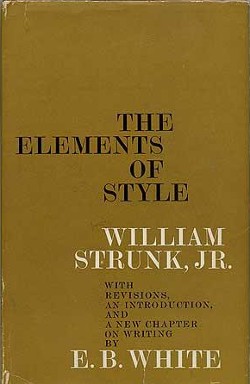Yours truly was an English Major back in the Pleistocene :) though I never learned how to write with any degree of proficiency until meeting up with The Elements of Style, the masterwork by Will Strunk and EB White, a slender volume of wit and wisdom everyone should read over and over again to become competent in an art form requiring one to have the ability to make thoughts coming from one's mind comprehensible using only words on paper to make it happen. The value of the humanities, in my opinion, is the ability to make connections, to see relationships among seemingly disparate ideas as this is the start point for all creativity no matter what the discipline shaping the creative act may be.
The losing of the humanities, along with the inability to read and write cursive, leaves the world a little less interesting and vital as we move toward a reality increasingly driven by tech and AI.
To whit ...
Justin Kovach, another senior, loved to write and always had. He’d blown through the thousand-odd pages of “Don Quixote” on his own (“I thought, This is a really funny story”) and looked for more big books to keep the feeling going. “I like the long, hard classics with the fancy language,” he said. Still, he wasn’t majoring in English, or any kind of literature. In college—he had started at the University of Pittsburgh—he’d moved among computer science, mathematics, and astrophysics, none of which brought him any sense of fulfillment. “Most of the time I would spend avoiding doing work,” he confessed. But he never doubted that a field in stem—a common acronym for science, technology, engineering, and mathematics—was the best path for him. He settled on a degree in data science.
In 2022, though, a survey found that only seven per cent of Harvard freshmen planned to major in the humanities, down from twenty per cent in 2012, and nearly thirty per cent during the nineteen-seventies. From fifteen years ago to the start of the pandemic, the number of Harvard English majors reportedly declined by about three-quarters—in 2020, there were fewer than sixty at a college of more than seven thousand—and philosophy and foreign literatures also sustained losses. (For bureaucratic reasons, Harvard doesn’t count history as a humanity, but the trend holds.) “We feel we’re on the Titanic,” a senior professor in the English department told me.
At Columbia University—one of a diminishing number of schools with a humanities-heavy core requirement—English majors fell from ten per cent to five per cent of graduates between 2002 and 2020, while the ranks of computer-science majors strengthened.
But there's a silver lining ...
Surprisingly, many in the future biz concur. A funny thing about the market mentality, they note, is that it knows only what’s judged to have future value right now. Career studies have shown that humanities majors, with their communication and analytical skills, often end up in leadership jobs. To that extent, the value of the educated human touch is likely to hold in a storm of technological and cultural change.
From this writer's perspective, the silver lining notion rings true as the flexibility of thought and the ability to understand gets leveraged when doing the humanities bit as you are a generalist who knows a little about a lot, something extremely valuable in an age of endless specialization where the weeds count and not the field. Food for thought, right? :)
Stopping for a little rest. :)




No comments:
Post a Comment